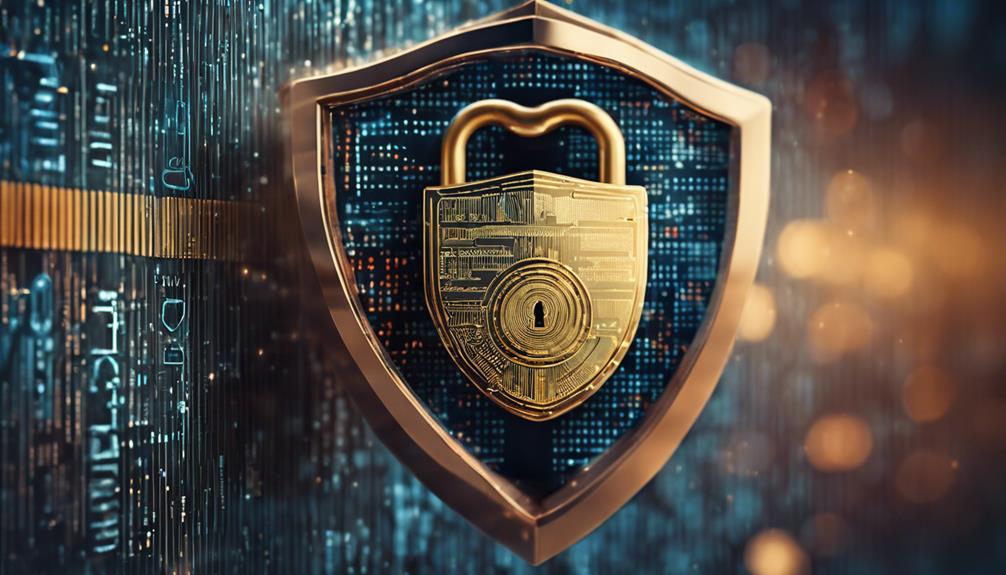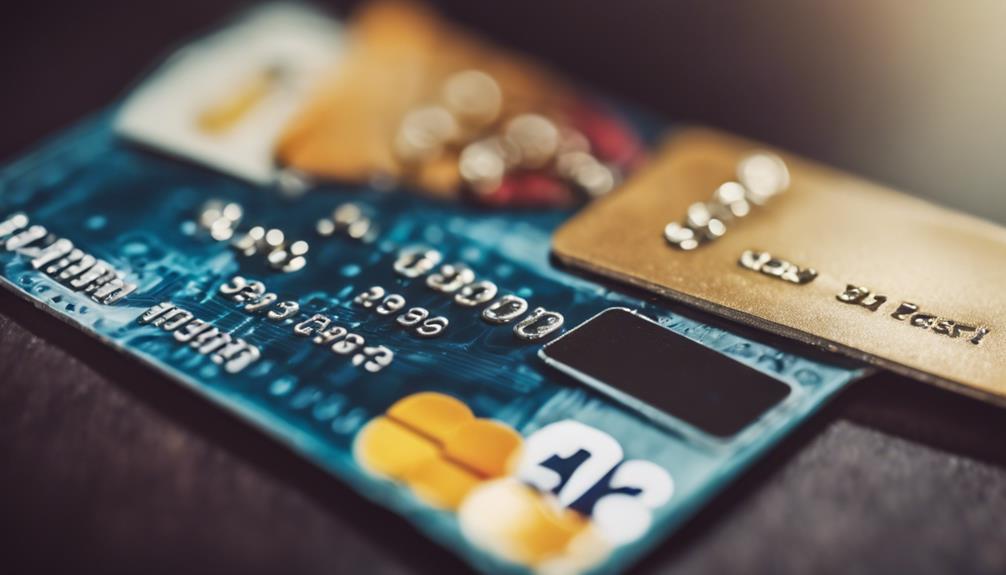To guarantee safe online transactions, opt for secure payment gateways. These gateways employ robust encryption methods like SSL and TLS for data protection. Compliance with industry standards, such as PCI DSS, is crucial. Tokenization replaces sensitive data with unique tokens, enhancing security. Implementing two-factor authentication strengthens transaction security. Choose platforms adhering to PCI DSS and utilizing encryption protocols. Regular system updates and employee training mitigate risks. These steps reduce unauthorized access, uphold trust, and combat fraud. Enhance your knowledge on secure online transactions by exploring further details.
Key Takeaways
- Utilize strong encryption methods like SSL/TLS for secure connections.
- Maintain compliance with industry standards such as PCI DSS.
- Implement tokenization to protect sensitive payment data.
- Enable two-factor authentication for enhanced security.
- Regularly update systems and train employees to mitigate risks.
Importance of Payment Gateway Security

Ensuring strong security measures in payment gateways is vital to safeguard sensitive financial information and prevent potential fraud risks. Payment gateways serve as the intermediary between merchants and financial institutions, handling online transactions securely. By implementing robust security protocols, such as PCI DSS compliance standards, payment gateways can protect credit card data and ensure the confidentiality of financial transactions.
Maintaining secure payment gateways is essential, especially considering the projected global cost of payment card fraud reaching $35 billion by 2024. Protecting data during online transactions is paramount for building trust between merchants and customers. Adhering to PCI DSS compliance standards not only enhances security but also demonstrates a commitment to safeguarding customers' financial information.
Data Encryption for Secure Transactions
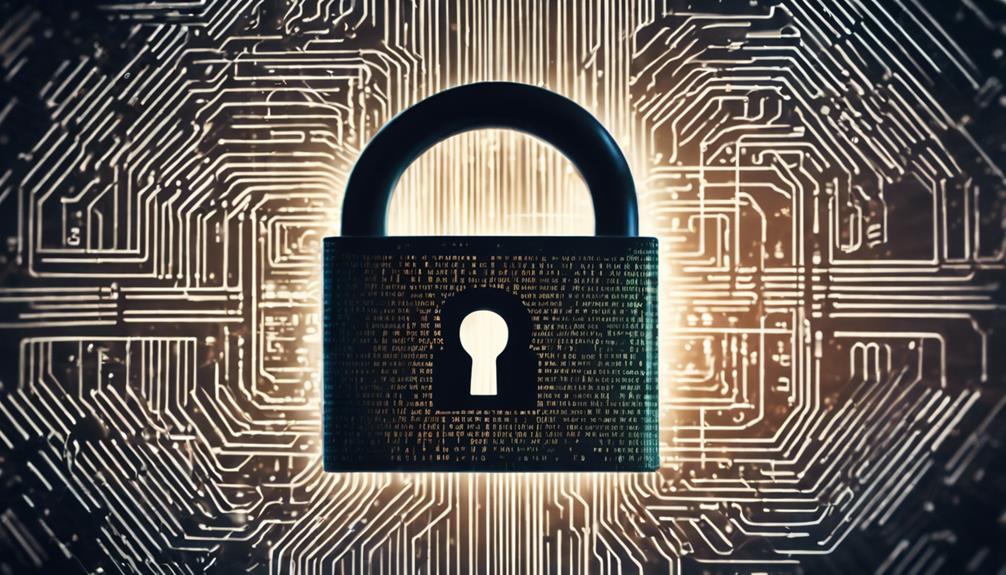
When it comes to secure transactions, utilizing robust encryption methods is vital.
By implementing encryption techniques like SSL and TLS, you guarantee that sensitive data remains protected during transmission.
Compliance with industry standards, such as PCI DSS, is essential to safeguard customer payment details effectively.
Strong Encryption Methods
To guarantee the security of online payment transactions, implementing robust encryption methods like SSL/TLS protocols is essential. Data encryption plays a pivotal role in ensuring secure connections, protecting data integrity, and maintaining user privacy during online transactions. SSL/TLS encryption protocols transform sensitive information into a secure format, making it difficult for unauthorized parties to access. Strong encryption algorithms and effective key management practices are critical for safeguarding data and preventing breaches. Regular updates and assessments of encryption methods help enhance the security of online transactions, providing users with confidence in the protection of their information. Below is a table summarizing the key aspects of strong encryption methods in payment gateways:
| Encryption Methods | Key Features |
|---|---|
| SSL/TLS Protocols | Establish secure connections |
| Data Protection | Ensures privacy |
| Secure Format | Maintains data integrity |
| Key Management Practices | Essential for security |
Compliance With Standards
Comply with industry standards for data encryption to guarantee secure online transactions. Utilizing SSL/TLS protocols ensures data integrity, authenticity, and privacy during information exchange.
Encryption plays an essential role in transforming sensitive data into a secure format, preventing unauthorized access and maintaining data privacy. TLS enhances security by providing updated encryption algorithms for secure communication.
Adhering to compliance rules such as PCI DSS is important for secure transactions online. By following encryption standards and implementing secure communication protocols, payment gateways can create a safe environment for processing online transactions.
Stay vigilant in keeping up with the latest encryption technologies to safeguard sensitive information and ensure a secure transactional experience for all users.
PCI-DSS Compliance Standards Overview
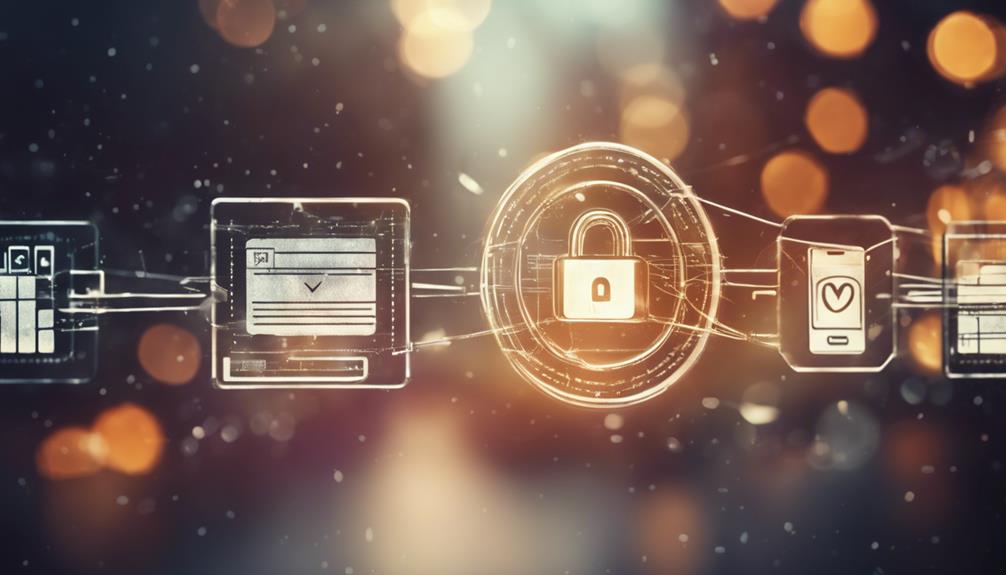
PCI-DSS compliance standards ensure a secure environment for transactions by mandating specific security measures and protocols. Adherence to these industry standards is essential for ensuring the protection of cardholder data and maintaining a secure payment experience.
By implementing encryption protocols and stringent compliance measures, businesses can safeguard sensitive financial data from potential data breaches and unauthorized access.
Non-compliance with PCI-DSS standards can lead to severe consequences, including financial penalties and reputational harm. Hence, it's imperative for organizations that handle card transactions to prioritize PCI-DSS compliance to uphold trust and security in online payments.
These standards play an important role in mitigating the risk of card theft and fraud, ultimately enhancing the overall security of payment gateways.
Role of Tokenization in Security

Enhance the security of payment transactions by incorporating tokenization, a method that replaces sensitive payment information with unique tokens. Tokenization plays an important role in safeguarding sensitive customer data and preventing potential security breaches. Here are some key points to understand the significance of tokenization in ensuring secure online transactions:
- Data Protection: Tokenization replaces actual card details with randomly generated tokens, reducing the risk of data breaches and unauthorized access to sensitive information.
- Enhanced Security: By using unique tokens with no intrinsic value, tokenization makes it challenging for hackers to retrieve original card numbers, thereby enhancing overall security.
- Compliance: Tokenization helps businesses maintain compliance with industry standards and regulations related to data security, ensuring adherence to best practices.
- Customer Privacy: Implementing tokenization in a payment gateway protects sensitive customer information, minimizing the impact of potential security breaches and bolstering trust in online transactions.
Implementing Two-Factor Authentication
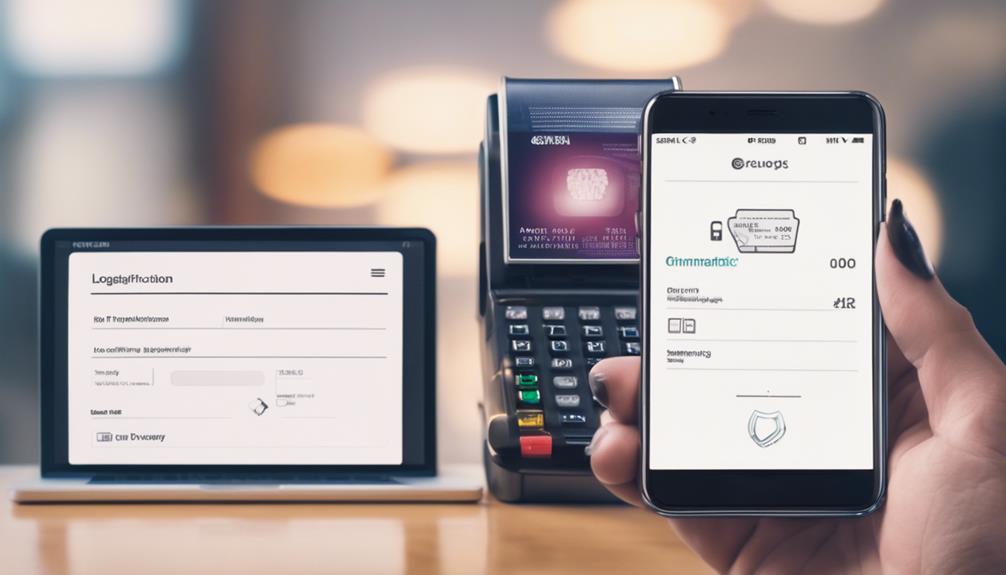
To strengthen the security of online transactions, consider implementing Two-Factor Authentication (2FA) for an added layer of protection. 2FA requires users to provide two forms of identification, typically user knowledge (like a password) and possession (like a mobile device), thereby enhancing online security measures. By incorporating 2FA, you reduce the risk of unauthorized access and enhance the security of your online transactions to a great extent. This extra layer of security is important in safeguarding against identity theft and fraudulent transactions.
With Two-Factor Authentication, the chances of malicious actors gaining unauthorized entry into your accounts are minimized. Google introduced 2FA in 2011, recognizing its importance in protecting user information. By combining something you know (like a password) with something you have (like a mobile device), 2FA ensures that only legitimate users can access the account, making it an essential tool in the fight against online security threats. Strengthen your transaction security today by implementing Two-Factor Authentication.
Choosing Secure Payment Gateway Platforms

Strengthen your online transaction security by selecting payment gateway platforms that prioritize adherence to PCI DSS compliance standards. When choosing a secure payment gateway, consider the following:
- SSL or TLS Encryption Protocols: Opt for platforms that utilize these protocols to guarantee data encryption and protection during online transactions.
- Tokenization: Look for gateways that offer tokenization, which substitutes sensitive payment information with unique tokens, enhancing security.
- 3D Secure Authentication: Choose platforms with 3D Secure authentication to add an extra layer of security and reduce the risk of fraud.
- Fraud Prevention Systems and Monitoring Capabilities: Select payment gateway providers that offer robust fraud prevention systems and monitoring capabilities to safeguard against financial fraud.
Regular Operating System Updates

Regular operating system updates play an essential role in safeguarding your payment gateway. By patching system vulnerabilities and ensuring software compatibility, you enhance the security of your online transactions.
Embracing regular updates is key to reducing the risk of cyber threats and protecting sensitive payment information.
Patching System Vulnerabilities
Ensuring your operating system stays updated is essential for safeguarding payment gateways against potential security vulnerabilities. Here are four important reasons why keeping up with regular updates is vital for protecting your online transactions:
- Regular updates help in patching system vulnerabilities, reducing the risk of data breaches.
- Patching system vulnerabilities through updates prevents unauthorized access to sensitive information.
- Up-to-date systems with the latest patches are critical in safeguarding payment processing from cybercriminals.
- Timely patching of system vulnerabilities is key to enhancing customer data protection and overall security of payment gateways.
Ensuring Software Compatibility
To ensure the smooth operation of payment gateways and protect against vulnerabilities, it's essential to maintain the compatibility of software through regular updates to your operating system. Regular operating system updates are necessary for enhancing system security, reducing the risk of data breaches, and ensuring excellent performance of payment gateways during online transactions.
Software compatibility plays an important role in the reliability of payment processing systems. Outdated operating systems can expose you to security risks, potentially leading to breaches. By staying current with updates, you minimize vulnerabilities and maintain the integrity of your system.
Prioritizing these updates is essential to safeguarding your payment gateway and ensuring secure online transactions.
Employee Training on Security Measures

Training employees on security measures is an essential step in enhancing the overall safety of payment gateways. Here are four key reasons why employee training is important for ensuring the security of online transactions:
- Reducing Risks: Proper employee training on online payment security helps in minimizing the likelihood of data breaches and financial fraud.
- Educational Seminars: Conducting seminars and workshops can effectively educate staff members on the importance of adhering to data protection guidelines.
- Addressing Security Threats: Well-trained employees are better equipped to recognize and address potential security threats promptly and efficiently.
- Enhancing Security: Educating staff on security measures not only improves payment gateway security but also plays a significant role in safeguarding sensitive financial information during online transactions.
Mitigating Risks in Online Transactions

Implementing robust authentication measures and encryption protocols can significantly reduce the risk of unauthorized access and data breaches in online transactions. By adhering to PCI DSS standards, payment gateways create a secure environment that helps businesses mitigate financial losses and fraud risks.
Utilizing technologies like 3D Secure adds extra layers of authentication, enhancing security further. Regular training sessions for employees on fraud awareness and security best practices are essential in combating risks associated with online transactions. These practices not only safeguard sensitive data but also instill a culture of vigilance within organizations.
In today's digital landscape where online payment fraud is on the rise, taking proactive steps to secure transactions is crucial. By prioritizing security measures and staying informed about the latest threats, businesses can protect themselves against potential data breaches and financial harm. Stay vigilant and implement best practices to guarantee safe and secure online transactions.
Frequently Asked Questions
What Are the Security Considerations for Payment Gateway?
When considering security in payment gateways, it's important to prioritize the following measures:
- PCI DSS compliance
- Data encryption
- SSL technology
- 3D Secure authentication
- Regular security audits
These measures work together to guarantee safe online transactions.
By adhering to industry standards and implementing strong security protocols, payment gateways can protect sensitive information and provide a secure environment for processing payments.
Stay vigilant and proactive in maintaining the security of your payment gateway to safeguard against potential threats.
How Can Customers Ensure the Security of Their Online Transactions When Using Payment Gateways?
To guarantee secure online transactions when using payment gateways, there are several key steps you should take. First, check for SSL certification (https://) and PCI DSS compliance. These certifications ensure that the connection and data handling meet industry standards for security. It's also essential to enable 2FA (two-factor authentication) for an extra layer of protection. Keeping your devices updated with the latest software patches and security updates is crucial to prevent vulnerabilities that could be exploited by cybercriminals. Additionally, choose payment gateways that offer tokenization, a method that replaces sensitive payment information with a unique token, to protect your payment data. Finally, it's vital to stay vigilant and continuously verify the security measures in place to safeguard your online transactions effectively.
Implementing these measures will help you conduct online transactions securely and protect your sensitive information from potential threats.
What Are the Security Measures of Online Transactions?
When conducting online transactions, security measures play an important role in safeguarding your information. Encryption and tokenization help protect your data, while two-factor authentication adds an extra layer of identity verification.
Compliance with PCI DSS standards maintains a secure environment for handling credit card details. Fraud detection systems monitor transaction patterns to prevent unauthorized activities.
Continuous innovation and upgrades are essential to stay ahead of emerging threats in online payment security.
What Should You Do to Ensure Secure Online Transactions?
To guarantee secure online transactions, you should implement two-factor authentication for added security. Regularly update encryption protocols and assess them to protect sensitive payment data.
Utilize fraud prevention systems with big data analytics and machine learning to reduce risks. Verify transaction details such as CVV and address.
Train employees on online payment security measures to enhance overall data protection. These steps help safeguard your transactions and personal information.
Conclusion
To summarize, ensuring security in payment gateways is essential for safe online transactions. By implementing measures such as data encryption, PCI-DSS compliance, tokenization, and two-factor authentication, you can protect sensitive information from cyber threats. In addition, it is important to prioritize mobile payment security with the increasing trend of using mobile devices for transactions. This includes incorporating security measures such as biometric authentication, secure QR codes, and device security protocols to prevent unauthorized access to payment information. By staying updated with the latest security technologies and best practices, businesses can uphold the trust of their customers and minimize the risk of financial fraud.
Remember, the early bird catches the worm – taking proactive steps to secure your payment processes will help mitigate risks and safeguard your financial transactions. Stay informed, stay vigilant, and keep your online transactions safe and secure.

